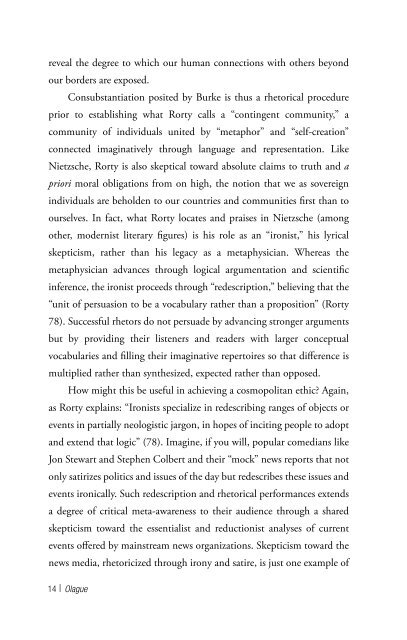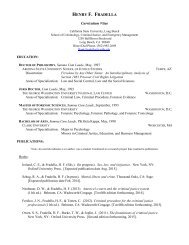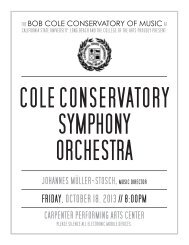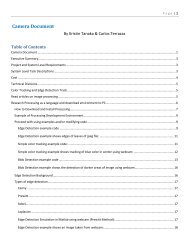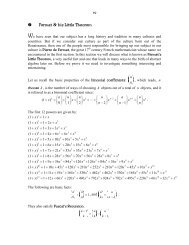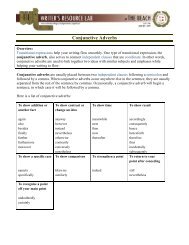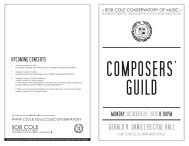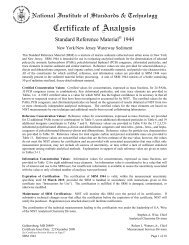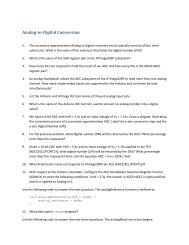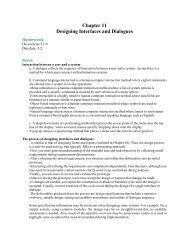Untitled - California State University, Long Beach
Untitled - California State University, Long Beach
Untitled - California State University, Long Beach
You also want an ePaper? Increase the reach of your titles
YUMPU automatically turns print PDFs into web optimized ePapers that Google loves.
eveal the degree to which our human connections with others beyond<br />
our borders are exposed.<br />
Consubstantiation posited by Burke is thus a rhetorical procedure<br />
prior to establishing what Rorty calls a “contingent community,” a<br />
community of individuals united by “metaphor” and “self-creation”<br />
connected imaginatively through language and representation. Like<br />
Nietzsche, Rorty is also skeptical toward absolute claims to truth and a<br />
priori moral obligations from on high, the notion that we as sovereign<br />
individuals are beholden to our countries and communities first than to<br />
ourselves. In fact, what Rorty locates and praises in Nietzsche (among<br />
other, modernist literary figures) is his role as an “ironist,” his lyrical<br />
skepticism, rather than his legacy as a metaphysician. Whereas the<br />
metaphysician advances through logical argumentation and scientific<br />
inference, the ironist proceeds through “redescription,” believing that the<br />
“unit of persuasion to be a vocabulary rather than a proposition” (Rorty<br />
78). Successful rhetors do not persuade by advancing stronger arguments<br />
but by providing their listeners and readers with larger conceptual<br />
vocabularies and filling their imaginative repertoires so that difference is<br />
multiplied rather than synthesized, expected rather than opposed.<br />
How might this be useful in achieving a cosmopolitan ethic? Again,<br />
as Rorty explains: “Ironists specialize in redescribing ranges of objects or<br />
events in partially neologistic jargon, in hopes of inciting people to adopt<br />
and extend that logic” (78). Imagine, if you will, popular comedians like<br />
Jon Stewart and Stephen Colbert and their “mock” news reports that not<br />
only satirizes politics and issues of the day but redescribes these issues and<br />
events ironically. Such redescription and rhetorical performances extends<br />
a degree of critical meta-awareness to their audience through a shared<br />
skepticism toward the essentialist and reductionist analyses of current<br />
events offered by mainstream news organizations. Skepticism toward the<br />
news media, rhetoricized through irony and satire, is just one example of<br />
14 | Olague<br />
how a contingent “self-created” community of globally situated strangers<br />
can form spontaneously and imaginatively, consubstantiated through<br />
counter-identifications against official gatekeeping institutions. The<br />
Rortyian ironist, and the identifications she provokes in her audience, also<br />
aligns with Burke’s definition of “humble” or “true irony” as one of the<br />
“four master tropes” that motivate discourse. According to Burke, “True<br />
irony, humble irony, is based upon a sense of fundamental kinship with<br />
the enemy, as one needs him, one is indebted to him, is not merely outside<br />
him as an observer, but contains within, being consubstantial with him”<br />
(514). In a sophistic sense, the advantages of a global network media<br />
is both the disease and the cure for a cosmopolitan worldview, since,<br />
as it tends to initially create divisions in the world, it also allows us to<br />
counter-identify with these divisions through irony and satire, permitting<br />
listeners or viewers to come together as an impromptu critical discourse<br />
community of insiders who “get” the joke, while those outside—power<br />
and authority—remain clueless.<br />
Some have criticized Rorty’s notion that the only basis for truth and<br />
forming a contingent community is through “free and open encounters”<br />
between citizens unyoked by tradition, custom, and essentialist definitions<br />
(68). Skeptics might point to 9/11 and its aftermath as proof of all that can<br />
go wrong by promoting such “free and open encounters.” But as Appiah<br />
notes, it is not necessarily a clash over values where conflict necessarily<br />
arises but the interpretation, by different communities, of those self-same<br />
values. Conflict arises, according to Appiah, when different groups of<br />
people essentially agree upon the same values but interpret or appraise<br />
these values differently. Appiah notes how when disagreements over the<br />
issue of abortion occur, both sides do not appreciably disagree about<br />
either the sanctity of life or the right women have over their own bodies<br />
as much as they would like to think they do, but instead disagree on<br />
where life begins and whose body is more important—in other words,<br />
Olague | 15


